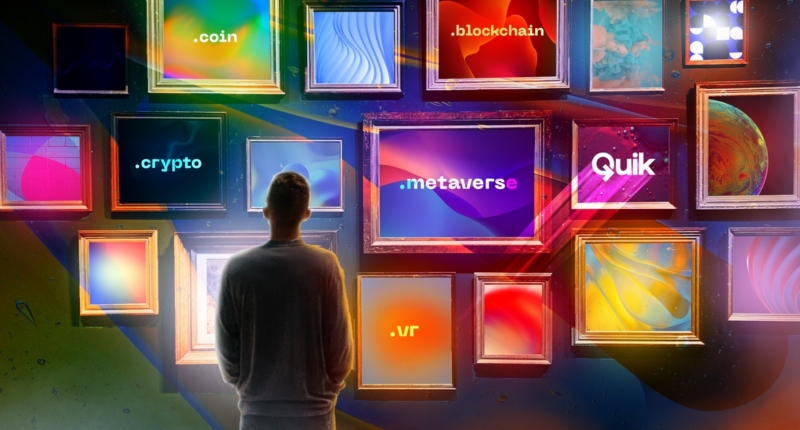NFT domains have a cultural significance in the digital age due to their potential to reshape and increase the adaptability of the Web3 realm. They replace complex blockchain addresses with human-friendly names, making them more human-adaptable. NFT domains are built on blockchain technology and authenticated into NFTs via smart contracts, making them unique and user-centric, with complete control over digital data and content. The NFT domain culture is all about decentralized identities, privacy, security, user ownership, and monetizing your work. It is about being who you are, exploring and experimenting with technology, and socializing autonomously with no limitations on expanding your imagination on tomorrow’s decentralized Web3. The blockchain qualities of NFT domains make everything safe, secure, transparent, and decentralized, offering cryptocurrency-enhanced payments, Web3-based decentralized websites, and uploading files as NFTs demonstrating decentralized and secured management and environment.
The Cultural Importance of NFT Domain Names in the Digital Age
NFT domains are the new technology that is changing the way we think about the internet. They are similar to the dot-com era in their potential to shape and increase the adaptability of the Web3 realm. But how are NFT domains culturally significant in the digital age of 2023 and beyond?
NFT domains are a technological advancement that replaces complex blockchain addresses with human-friendly names, making the system more user-friendly. This technology is built on blockchain technology and is authenticated into NFTs via smart contracts. This means that each NFT domain is a unique name with no duplicates.
The emergence of NFT domains has given people a decentralized vision with limitless boundaries to execute what they imagine. Traditionally, web domains and today’s online ecosystem are managed by centralized servers, and therefore, the imaginary experimental bounds are limited.
Since NFT domains are built on blockchain technology, they are safe, secure, privacy-oriented, transparent, traceable, and most importantly, user-centric. This means that the user has control over their digital data and content, rather than the program they access.
Unlike on the traditional web, where the server can obtain information from our email when we run an application, NFT domains give users more privacy control. Furthermore, on the traditional web, the user’s data is sold from one source to another, making it publicly available to all. But on NFT domains, users can claim, own and retain ownership of their data, which eliminates other parties from monetizing their original artwork, products, and monopoly.
The culture surrounding NFT domains is about decentralized identities. Users gain control over what happens to their data and can create a censorship-resistant decentralized website, transfer money more securely, and assign more value to digital collectibles. NFT domains are the rising trend of 2023, and they offer a new way for users to take ownership of their data and digital identity.
The NFT domain culture is powered by Quik.com, a platform that offers a vast selection of TLDs that capture and connect diverse genres of decentralized space with blockchain domains, Web3 domains, crypto domains, metaverse domains, and VR domains everywhere, all at once. While these NFT domains may have different genres, they all link, operate, and function the same way since they are minted, sold, bought, traded, and exchanged as NFTs.
In conclusion, NFT domains offer a new cultural shift in the digital age of 2023 and beyond. They are changing the way we think about the internet by offering users more control over their data, privacy, and digital identity. The culture surrounding NFT domains is about decentralized identities, and users can create a censorship-resistant decentralized website, transfer money more securely, and assign more value to digital collectibles. With Quik.com, the possibilities are endless, and the rise of NFT domains is a trend that will continue to grow in the coming years.
The Cultural Significance of NFT Domain Names in the Digital Age
The popularity of NFT domains is growing rapidly, with many users using Quik.com Domains, ENS Domains, and Unstoppable Domains on Web2 social media profiles. By connecting NFT domains to their social media accounts, users are establishing a cultural presence of Web3 on Web2 socials.
NFT domains have infiltrated the entire Web2 ecosystem, employing the same ideologies, marketing methods, communities, websites, and strategies but with a decentralized twist that eliminates the need for third-party integrations, regulations, and control.
The cultural significance of NFT domains in the digital age is paramount as it shifts the digital culture away from being manipulated by centralized regulating bodies and data being sold unknowingly to advertisers. Instead, it creates a digital age where the data owner and the centralized application or host control everything.
NFT domains are built on blockchain technology, which is a distributed P2P network on numerous nodes of computers. This technology is nearly impossible to hack because it would necessitate updating all blocks with roughly 51% accuracy. Since the change is traceable owing to the auto-generated hash, we are safe, secure, independent, and have complete freedom of speech on the decentralized web.
Ideas for Cultural Significance of NFT Domain Names
1. Interoperability
NFT domains have brought about a revolutionary change in the way in-game assets can be used. Previously, players could only use in-game objects in the game they were purchased for. However, with the introduction of Metaverse domains, players can now store, link, and associate in-game assets to other universes, generating revenue for gamers.
Companies can also benefit from interoperable solutions, such as connecting to their virtual office space via the Metaverse domain by Quik.com and visiting other firms for client meetings and showcasing their workplace, plans, etc. The key here is having a Metaverse domain, which allows users to hold, store, and connect with different metaverses using a single identity.
2. One-for-all
One identity for all would be the key to the previously discussed interoperable solution on Web3 space enabled by Quik.com’s VR domains. With VR domains, users can create a single identity or avatar for their virtual reality experience. This eliminates the need for multiple identities and allows users to maintain a consistent online reputation.
In conclusion, the cultural significance of NFT domains in the digital age cannot be overstated. NFT domains are a technological advancement that replaces complex blockchain addresses with human-friendly names, making the system more user-friendly. NFT domains have infiltrated the entire Web2 ecosystem, employing the same ideologies, marketing methods, communities, websites, and strategies but with a decentralized twist that eliminates the need for third-party integrations, regulations, and control. The ideas of interoperability and one-for-all have revolutionized the way users can use in-game assets and maintain their online reputation. With the rise of NFT domains, the digital age is shifting towards a decentralized future where users have more control over their data and digital identity.
NFT Domains: The Advancements in Decentralization and Freedom of Expression
NFT domains are taking the world by storm, offering users an easy and decentralized way to control their online identity, monetize their creative work, and socialize freely. These blockchain-enhanced domains have created a significant impact on the digital landscape, empowering users to enjoy the freedom of expression and ownership of their data and content.
Revolutionizing Interoperability
With NFT domains, you can transfer in-game objects to other games using Metaverse domains. This revolutionary change has enabled gamers to store, link, and associate in-game assets to different universes. It generates revenue for players and companies alike, allowing them to connect to their virtual office space via Metaverse domains, showcasing their workplace, plans, and more.
NFT domains allow users to hold, store, and connect with different metaverses using a single identity. VR domains by Quik.com enable users to create a single identity or avatar for their virtual reality experience, eliminating the need for multiple identities and maintaining a consistent online reputation.
Privacy and User Ownership
NFT domains are all about privacy, security, and user ownership. Unlike on the centralized web2, where you must portray what the application wants to see, NFT domains allow you to be yourself. You control and manage your identity’s operations and, more significantly, own what you are to help you be who you are.
On the decentralized Web3, you can simply be yourself, upload your ideas, and explore and experiment with technology. With no limitations to expanding your imagination, NFT domains allow users to enjoy a decentralized environment where they can truly express themselves.
Monetizing Creativity
With NFT domains, you can monetize your work by running a website or gallery, generating subscriptions, selling digital artworks, and more. This eliminates the function of a publisher and other third-party commission eaters, resulting in an autonomous monetized monopoly.
Users can associate and facilitate safe transfer of ownership and payment acceptance through Crypto transactions. You can establish subdomains of your Crypto domains and sell them to other users to earn directly through the domain, as well as tie these subdomains to your digital collectibles and products to raise the value and visibility even more.
Web3 is the platform for individuals tired of centralized monitoring and control over data, which limits freedom of speech and expression. With NFT domains, users can create a decentralized community hosting independent websites utilizing blockchain domains.
Users can simply buy a blockchain domain on Quik.com, connect it to a decentralized website, and share it with their community with private access and no worry of data, content, or the website getting blocked or suspended.
Transparent and Safe Transactions
Every transaction and event is recorded on the blockchain and made public, making everything transparent, secure, and safe. This traceable corruption feature ensures that users can enjoy a secure and transparent experience when using NFT domains.
In conclusion, NFT domains have revolutionized the digital landscape, providing users with an easy and decentralized way to control their online identity, monetize their creative work, and socialize freely. These blockchain-enhanced domains have created a significant impact on the digital landscape, empowering users to enjoy the freedom of expression and ownership of their data and content. With NFT domains, the decentralized future is here to stay, and the possibilities are endless.
The use of Web3 domains allows for tracing suspicious activity, including employment breaches, by tracking the transfer of funds and NFT documents uploaded on decentralized websites. Additionally, any attempts to pollute the Web3 domain space are traceable due to blockchain technology, which records every transaction, making secured management a top priority in the NFT domain space. Businesses can benefit from the secure functionality offered by blockchain-based NFT domains and subdomains, which provide cryptocurrency-enhanced payments, Web3-based decentralized websites, and NFT uploads. It’s important to avoid constantly updating and altering wallets as it creates an unending circle, and the history of transactions can always be traced. In conclusion, the cultural significance of NFT domains in the digital age cannot be overstated, and taking advantage of NFT domains to unlock your identity is a valuable opportunity.
Don’t miss interesting posts on Famousbio









